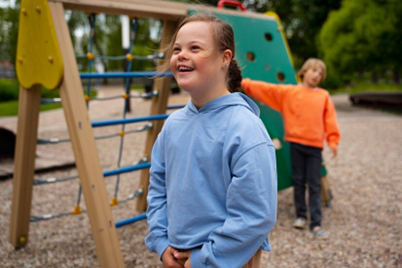A genetic disorder caused by an extra copy of chromosome 21, resulting from abnormal cell division which leads to developmental delays, intellectual challenges, and distinct physical characteristics. Early intervention and greater awareness of Down syndrome enhance the quality of life for affected children.
Symptoms of Down Syndrome
Physical Signs
- Low muscle tone
- Flat facial profile and a small head
- Upward slanting eyes
- Short neck
- Small ears
- A single deep crease across the palm
- Excessive flexibility
- Poor coordination and balance
Cognitive and Developmental Signs
- Delayed cognitive development
- Delayed speech and language skills
- Learning disabilities
- Poor short-term memory
- Difficulty with judgment and problem-solving
- Challenges with abstract concepts
Causes of Down Syndrome
Down syndrome is primarily caused by an extra copy of chromosome 21 (trisomy 21), which occurs due to an error in cell division in the egg or sperm. While it can be inherited, most cases are due to random events. Factors such as advanced maternal age, certain environmental exposures, and specific chromosomal abnormalities can increase the risk of Down syndrome.
Risk Factors
- Advancing Maternal Age: Women over 35 have a higher risk of having a child with Down syndrome.
- Family History: Having one child with Down syndrome increases the likelihood of having another.
- Chromosomal Abnormalities: Conditions like translocations can elevate the risk.
- Parental Health: Conditions like diabetes and obesity in parents are linked to a higher risk.
Diagnosis
Down syndrome is usually diagnosed through prenatal screening and confirmed with tests that identify the presence of extra chromosomes.
Treatment
Treatment is customized to each individual’s needs and includes early intervention services such as physical, occupational, and speech therapy, along with special education, medical care, and social skills training.
Preventative measures include taking folic acid, monitoring maternal age, undergoing prenatal screenings, genetic counselling, and maintaining a healthy lifestyle to reduce the risk of Down syndrome.
Down syndrome is a genetic disorder caused by an extra chromosome 21, leading to developmental delays and distinct physical traits. Early intervention, tailored support, and preventive measures can significantly improve the quality of life for those affected, helping them achieve their full potential.


